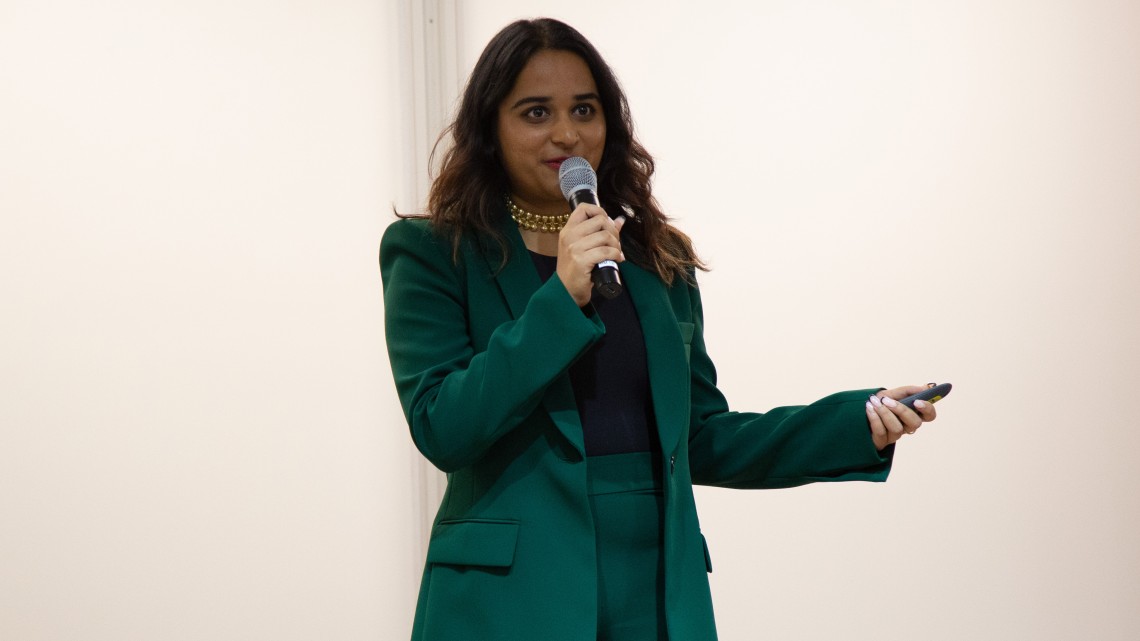
eLab student founder Pranjal Jain '23 pitches her yoga clothing company Praali to an audience at eLab’s New York City Pitch Night on Oct. 20, 2022.
News directly from Cornell's colleges and centers
Eleven eLab teams advance to spring semester
By Lauren Simpson
Of the 28 teams that eLab, Cornell’s student accelerator, welcomed in the fall, 11 student startups will continue on to the spring semester having validated their diverse business ideas.
With Cornell’s entrepreneurial ecosystem consistently strengthening, an increasing number of applicants demonstrate the potential to develop their business idea into a successful student startup each year. To allow a wider net to be cast in identifying which of these businesses show the most promise, eLab’s structure took a new form in 2022-23.
The solution – provide more teams with the skills to self-assess their business models in the fall and advance the student startups that made the most progress to the next phase of their eLab journey in the spring. The 28 teams initially chosen to participate represent the program’s largest cohort to date.
“We didn’t change what we did, but we did it with more teams,” said Ken Rother, managing director of eLab and lecturer at the Cornell S.C. Johnson College of Business. “There’s no question that had we made the final cohort decision in the fall, we would have taken a few teams that weren’t ready and missed a few that were.”
The 11 teams that were “ready” to move into the spring showed significant progress in refining their business idea, including developing a scalable business model, identifying a specific customer with a problem that they would like to solve and determining the necessary resources to start building a solution.
Cair Fare, founded by MBA student Ian Cairns, is one of the teams advancing to the spring semester. The startup delivers functional food products that promote a sense of well-being.
“Cair Fare made significant progress this past fall,” Cairns said. “Our company’s business model has been refined during the customer discovery process to deeply understand the nuances of the target market’s problem – wanting to eat more plant-based whole foods.”
The teams that did not advance received equally valuable insight, gaining an awareness of potential next steps, learning about Cornell’s entrepreneurial resources or, in some cases, recognizing that their business model is not as viable as they originally thought.
“When you give more teams access to the tools to self-assess, the teams that are ready, willing and want to continue are in much better shape,” Rother said. “The teams that are not didn’t do the wrong thing and just go build something. They realize that they aren’t sure of what to make yet or who their customer is.”
The accompanying academic requirements were designed to aid teams with their business model refinement, but the success of a team’s business model did not necessarily indicate students’ performance in the class.
“There are teams that did not move forward that received perfectly good grades,” Rother said. “The grade proves that you did the work. The work then illustrates, ‘Should I go forward?’”
Throughout the spring semester, the 11 student startups will continue to seek mentorship from a network of successful Cornell alumni as they prepare for launch. Several opportunities to present their progress to potential investors and the Cornell entrepreneurial community lie ahead, including a new West Coast event, “Cornell Silicon Valley Presents: Student Startup Showcase,” from 6 to 8:30 p.m. PST March 30 at the Autodesk Gallery in San Francisco.
The event will feature a keynote by Krystyn J. Van Vliet, the newly appointed vice president for research and innovation at Cornell, and pitches from student startups in eLab and the Runway Startup Postdoc programs.
“This is another big opportunity for exposure, and that exposure can benefit them in multiple ways, including mentorship, access to customers and potential investment opportunities,” Rother said. “If there are 100 people in the audience, every one of them probably knows 10 people, if not more. You’re not talking to the 100 people in attendance, you’re talking to their networks out in the world, and that’s compelling.”
eLab’s student startups will also pitch at the program-culminating Demo Day at 4:30 p.m. April 13 during Entrepreneurship at Cornell Celebration.
The students and startups taking part in the eLab spring semester:
- Adaptive Rentals, doctoral student Jeremiah James.
- Cair Fare, MBA student Ian Cairns.
- Chamak, M.P.A student Debasish Chakraborty.
- Gig-Up, MBA student Trish Dessai.
- Pluto Street, MBA student James Duong.
- Praali, Pranjal Jain ’23.
- Starting Real Estate, Cornell Law School and MBA student Nitin Tangellamudi.
- Taoty, doctoral student Dave Huang and Fiwany Wijaya ’22.
- Tourable, David Yun ’23 and Sean Cai ’25.
- Synopsis, Daniel Tuan ’24 and Max Pace ’24.
- Wearth, Gary Phan ’23, Serena Huang ’24 and Ioana Nechiti ’24.
Media Contact
Get Cornell news delivered right to your inbox.
Subscribe
